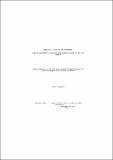| dc.description.abstract | In most Asian countries, it seems likely that agriculture will have
to provide livelihoods for much larger populations in the 21st
century. To be sustainable and effective,this will require more
intensive and complex farming systems, with more farm enterprises and
more internal linkages. For these farming systems, the balance of
advantage shifts from scientists to farmers in managing complexity,
exploiting diversity, in experimenting and in innovation. Recent
findings from participatory rural appraisal in India and Nepal
indicate that given good rapport, rural people can manifest greater
analytical capabilities than outsider professionals have supposed.
New roles for outsider professionals are implied, to be convenors,
catalysts and consultants, searchers and suppliers, and tour
operators. The technology now most needed and most lacking is
methodological - to change personal attitudes, demeanour and methods
of interacting, and institutional, to enable scientists and
extensionists to play their new roles. | en_GB |

